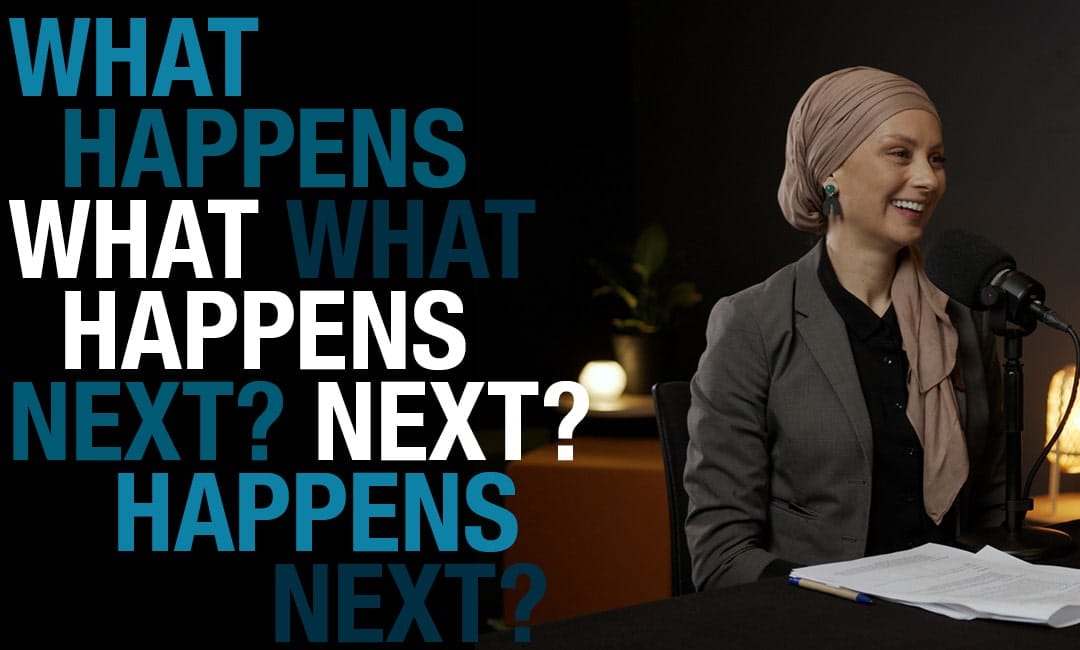
Monash University’s multi-award-nominated podcast, What Happens Next?, returns on 18 March with a new season of tough challenges and expert guests.
Now in its sixth season, What Happens Next? is a sliding-doors podcast that examines some of the biggest challenges facing our world. Hosted by academic and social commentator Dr Susan Carland, each two-episode arc within the season addresses a new set of topics looking at the future we’re facing if we don’t change, the future we could have if we do, and how to get the kind of future we all want.
In the upcoming season, world-leading experts share their insights and research on the future of soldiering, digital vigilantism, slow fashion, weight loss, loneliness, and women’s role in peacekeeping as explored through the lens of the crisis in Afghanistan.
Expert guests include Gender, Peace and Security Centre Director Professor Jacqui True, named one of the 100 most-influential people in gender policy in 2021; 2009 Australian Life Scientist of the Year Dr Michael Cowley; Dr Suzanne Nielsen, Deputy Director of the Monash Addiction Research Centre; and other leading researchers.
Other notable guests this season include celebrity personal trainer Michelle Bridges, federal MP Andrew Giles, designer and Instagram influencer Nicole McLaughlin, former SAS commanding officer Ben Pronk, and former Australian Ambassador for Women and Girls Natasha Stott-Despoja AO.
Listen: Visit the ‘What Happens Next?’ back catalogue
New episodes of What Happens Next? will be released weekly from Friday, 18 March, 2022. To be alerted when new episodes are available, subscribe now. You can also listen to every episode of What Happens Next?, including its entire back catalogue, here on Monash Lens.

Transcript
Dr Susan Carland: Welcome back to an all-new season of What Happens Next?, the podcast that examines some of the biggest challenges facing our world and asks the experts: What will happen if we don’t change? And what can we do to create a better future? I’m your host, Dr Susan Carland. What’s ahead of you this season on the podcast?
Digital vigilantism. Just because we can use the internet to distribute citizen justice doesn’t mean we should… right? We’ll find out.
Dr Mark Howard: Digital vigilantism, by definition… if it's going to be ethical it can't be based on the promotion of self-interest, and it can't be promoting the notion of vengeance.
Dr Susan Carland: The future of soldiering. Robotics, autonomous systems and AI are becoming more commonplace in our militaries. What does that mean for the human soldiers working alongside them?
Professor Rob Sparrow: I think there's a real risk that in the future, wars will be started by computers who have been granted an authority to fire in certain circumstances, detect something, or maybe just make a mistake, open fire, and that drags the rest of us into a war.
Dr Susan Carland: Slow fashion. The textile industry produces an enormous amount of waste, and the knock-on effects are shocking. Is it possible to be an ethical fashionista? The experts weigh in.
Aleasha McCallion: We're chewing through all of that at such an expansive speed that we really have no choice. We don't have 50 years.
Dr Susan Carland: Weight loss. You can’t go anywhere without hearing about the latest fad diet or workout. But do they really work? And what’s going on with the way we talk about fat?
Dr Michael Cowley: It's hard to lose weight, and it's really hard to keep it off. And the clinical data suggests only about 20% of people who lose weight can keep it off.
Dr Susan Carland: Loneliness. It may be the age of social media, but people are reporting higher levels of loneliness than ever before. How can we connect with the most isolated among our communities?
Andrew Giles MP: The evidence that we have in Australia indicates that about one in four of us reported feeling lonely, some or all the time before the pandemic, which I think counts as a crisis. It's something we should be talking about when we understand that the health impacts on individuals are really quite serious.
Dr Susan Carland: And finally, women in Afghanistan – You’ll hear a harrowing story of escape from the Taliban, and we’ll investigate the role women can play in peacekeeping when they’re invited to the table.
Professor Sharon Pickering: There are no girl children in schools right now in Afghanistan … For every month, for every year, they are not in school, that will reshape the destiny of Afghanistan.
Dr Susan Carland: Our new season premieres next week on your favourite podcast app. Subscribe now and learn what happens next.





